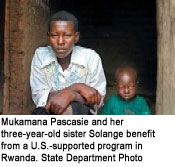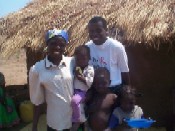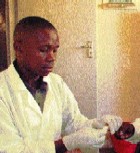|
|
The U.S. Government is Keeping its Promise to Care for Those Impacted by HIV . . .
The U.S. President' s Emergency Plan for AIDS Relief (the Emergency Plan) supports the integration of care for those infected with or affected by HIV/AIDS with HIV prevention and treatment efforts. In the 15 Emergency Plan focus countries, nearly 20 million people are living with HIV/AIDS and at least 8 million children have been orphaned and made vulnerable due to HIV/AIDS. Under national strategies and in coordination with host governments, the Emergency Plan supports a range of activities aimed at improving the lives of people living with and affected by HIV/AIDS, including orphans and vulnerable children, that include caregiver training; access to education; economic support; food and nutrition support; legal aid; medical, psychological and emotional care; and other social and material support activities.
The following stories are just a few examples of how the Emergency Plan is supporting national strategies and working with host nations to provide care to people living with and affected by HIV/AIDS.
Helping AIDS Orphans in Rwanda
 Sixteen-year-old Mukamana Pascasie lost both her parents to AIDS. Her three-year-old sister Solange was born with the disease. Mukamana is now participating in a U.S. Government-funded project which provides food assistance and psychosocial support, as well as vocational training. Mukamana is learning how to sew to earn a living through Child Headed Households, a program geared to 15 to 19 year-old youth. The group teaches participants how to save money every week to use for income-generating projects. The vocational training helps youth to develop income-generating activities using skills developed during courses. Because of the training, Mukamana is able to provide for her family. Her little sister, Solange, is currently in good health and the family's situation is improving due to the resources provided by U.S. Government programs. Sixteen-year-old Mukamana Pascasie lost both her parents to AIDS. Her three-year-old sister Solange was born with the disease. Mukamana is now participating in a U.S. Government-funded project which provides food assistance and psychosocial support, as well as vocational training. Mukamana is learning how to sew to earn a living through Child Headed Households, a program geared to 15 to 19 year-old youth. The group teaches participants how to save money every week to use for income-generating projects. The vocational training helps youth to develop income-generating activities using skills developed during courses. Because of the training, Mukamana is able to provide for her family. Her little sister, Solange, is currently in good health and the family's situation is improving due to the resources provided by U.S. Government programs.
Creating Income Generation Projects in Thailand
Two U.S. Government-sponsored volunteers work closely with a support group for people living with HIV and AIDS in the community of Buyai in Thailand. The support group has approximately 42 members from three sub-districts and is led by two HIV-positive women.
One of the leaders is a widow with three children and the other is a single mother with two children. The two support group leaders have worked with the members of the group to design an income-generating project. They are training the group members in how to make, market and sell grass mats in order to earn money for medicine, school fees, funeral costs, and more. In addition, the group is designing and implementing HIV/AIDS education workshops for the support group as well as for the community at large. They hope to target a significant number of the 900 community members in and around Buyai.
Supporting Home-Based Care in Mozambique
 |
| Esperanza, pictured with her home care volunteer and her family, shows that there is hope for people living with HIV and AIDS. | In 2003, Esperanza lived with her husband and three children in the village of Moatize, Tete Province, Mozambique. After seeing a presentation about HIV/AIDS at a local market, Esperanza went to the local HIV testing center where she was tested and told she was HIV positive. Staff at a nearby hospital asked a home-based care program to assign a volunteer to help Esperanza. The Mozambique Ministry of Health, with support from the Emergency Plan, has coordinated the rapid expansion of community home-based care programs that now provide direct care to more than 18,000 people living with HIV/AIDS, including Esperenza.
Esperanza's home care volunteer emphasizes the importance of regularly taking medicine to prevent opportunistic infections and evaluates her symptoms to determine if she needs care from a health professional or a referral to start antiretroviral treatment. As a result of this home-based care, Esperanza is now healthy. With the encouragement of her home care volunteer, she even started a small business making corn- and rice-based drinks rich in vitamins that she sells to her neighbors.
Fighting AIDS with Counseling and Testing
 |
| Reverend Disi learned about HIV/AIDS through counseling and testing services in Malawi. | Reverend Ephraim Disi, director of Brethren in Christ Churches in Malawi, learned he was HIV positive in 1996. His wife had died of the disease the previous year. Seven years later, Disi remembers the counseling he received along with his HIV test. " It was a pivotal point for me," says Disi. " Before the test, I didn't tell anyone, and I found excuses for any symptoms. The counselor helped me face the reality of the disease and its effect on my body. The information helped me to tell a few trusted colleagues, and eventually to speak publicly about my experience." In 1996, Disi was one of the few in Malawi who had access to a counseling and testing program for HIV/AIDS. Since that time, the U.S. Government has funded the expansion of testing sites from three to 12 with the support of its partner organizations. Through expanded counseling and testing services in Malawi, many others will receive the facts and support they need to help stop the spread of HIV/AIDS. |
|
President George W. Bush's Emergency Plan for AIDS Relief is the largest commitment ever by any nation for an international health initiative dedicated to a single disease' a five-year, $15 billion, multifaceted approach to combating the disease around the world.
U.S. Department of State
U.S. Agency for International
Development
U.S. Department of Defense
U.S. Department of Commerce
U.S. Department of Labor
U.S, Department of Health
and Human Services
Peace Corps
Mailing Address:
SA-29, 2nd Floor
2201 C Street, NW Washington, DC 20522-2920
www.pepfar.gov
|

 PDF version
PDF version 